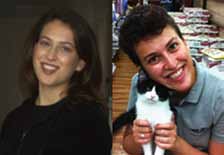Happening
Congregation Beit Simchat Torah
In response to a small ad in the Village Voice, barely a minyan of gay Jews gathered to  celebrate Shabbat on a cold Friday night in February 1973. The first 40 years of what became the pioneering and influential synagogue CBST are documented in Changing Lives, Making History: Congregation Beit Simchat Torah, by Rabbi Ayelet S. Cohen. Rabbi Sharon Kleinbaum, who now leads the congregation of 600 households writes in her foreword: “These past 40 years have witnessed among other things, the impact of AIDS, breakthroughs in reproductive technologies and the gay baby boom, the emergence of the queer and trans movements, and major Supreme Court decisions in support of equal rights.” cbstbook.com
celebrate Shabbat on a cold Friday night in February 1973. The first 40 years of what became the pioneering and influential synagogue CBST are documented in Changing Lives, Making History: Congregation Beit Simchat Torah, by Rabbi Ayelet S. Cohen. Rabbi Sharon Kleinbaum, who now leads the congregation of 600 households writes in her foreword: “These past 40 years have witnessed among other things, the impact of AIDS, breakthroughs in reproductive technologies and the gay baby boom, the emergence of the queer and trans movements, and major Supreme Court decisions in support of equal rights.” cbstbook.com
The December Project
Shortly before Jewish renewal movement founder Rabbi Zalman Schachter-Shalomi died in July at age 89, the book The December Project: An Extraordinary Rabbi and a Skeptical Seeker Take Aim at Our Greatest Mystery by Sara Davidson appeared. In it, the guru-like rabbi shared eldering wisdom and anticipatory thoughts on dying well: dis-identifying with your body, coping with memory loss, forgiving others and yourself, making room for intuition, hanging a bell that will periodically remind you of the passage of time, and rehearsing your final moments. The book is a chance for a wider audience to access the teachings of Reb Zalman, one of the early ordainers of women rabbis. harpercollins.com
Adoption and Jewish Identity
Were you adopted? Are you between 18 and 36, raised in a family that identified at least in part as Jewish, or do you know someone who fits this description? To help improve the lives of Jewish adoptive families, creating broader understanding of the unique religious, cultural, and identity issues they face, the Adoption and Jewish Identity Project wants to hear stories from young adult adoptees raised in American Jewish families. Jennifer Sartori and Jayne Guberman head the research team. Adoptees, share your story in writing or via other media (audio, video). Questions? adoptionandjewishidentity@gmail.com Survey: www.surveymonkey.com/s/AJIPAdopteeQuestionnaire
“It Gets Besser”
 People who leave ultra-Orthodox (Haredi) Judaism often feel trapped by the myth that they can’t have happy and healthy lives if they go “off the path.” A project, using Yiddish to play on the message “It Gets Better” for gay youth, “It Gets Besser” lets Haredim know that if they do want to leave, they can have a better life than the frightening stories they’ve been warned about. This volunteer grassroots project, created by
People who leave ultra-Orthodox (Haredi) Judaism often feel trapped by the myth that they can’t have happy and healthy lives if they go “off the path.” A project, using Yiddish to play on the message “It Gets Better” for gay youth, “It Gets Besser” lets Haredim know that if they do want to leave, they can have a better life than the frightening stories they’ve been warned about. This volunteer grassroots project, created by
former ultra-Orthodox Jews, began with a video compilation of beforeand- after photos as evidence of welladjusted post-Haredi life. The online gallery has garnered over 40,000 views since 2012. Now the project includes in-depth profiles, a video showcasing the unique identities of former ultra-Orthodox Jews and more. getsbesser.com, itgetsbesser@gmail.com
When Your Baby’s a Girl…
Sociologist Rela Mintz Geffen notably said that the birth of a daughter is “likely to startle a Jewish woman into an awareness of her inequality in the tradition…when all the people who’d planned to come for the bris [i.e. circumcision] cancel their reservations.” Scholar Sharon R. Siegel, in A Jewish Ceremony for Newborn Girls aims to take our rituals for newborn girls into a new phase, describing the customs and experimentation of recent decades, incorporating, reframing and proposing a liturgy that, as the subtitle of the book states, will be “The Torah’s Covenant Affirmed.” From the Hadassah Brandeis Institute’s series on Jewish women. upne.com
Guns and Domestic Violence
In July 1988, a 41-year-old woman who was a member of Jewish Women International in Gaithersburg, MD. was gunned down by her estranged husband in the parking lot of her workplace. The shocking murder gave the 100-year-old Jewish women’s organization a new mission — to protect all women and girls from violence. The organization’s CEO, Lori Weinstein, recently testified at a Senate Judiciary Committee’s first-ever hearing on the intersection of gun violence and violence against women, saying “From 2001 through 2012, 6,410 women were murdered in the U.S. by an intimate partner using a gun — more than the total number of U.S. troops killed in action during the entirety of the Iraq and Afghanistan wars combined.” JWI is the first Jewish organization to join the newly created Women Leadership Network founded by former congresswoman Gabby Giffords and other women leaders. #ProtectAllWomen Leadership Network
A Century of Sisterhood
An important anniversary can both revive memories and revisit history, as evident in Sisterhood: A Centennial of History of Women of Reform Judaism, edited by Carole B. Balin, Dana Herman, Jonathan D. Sarna and Gary P. Zola. Having grown from 52 chapters in 1913 to more than 500 today, with 65,000 members, WRJ’s activities range from promoting the building of sukkot, the sending of Purim baskets and the recitation of the blessing over bread before meals, to the raising of funds for major institutions of Reform Judaism and the creation of the 2007 book The Torah: A Women’s Commentary. And then there are those iconic community cookbooks and sisterhood gift shops. huc.press
The Road Taken
“If being single is a challenge for those who grew up with high school proms and tryout first kisses, it is nothing compared to finding yourself in the midst of a modern singles scene while coming right off the boat from a five-year-arranged marriage and a sex-segregated youth.” So says Frieda Vizel, in “After the Double Life.” The tenth-year anniversary journal of Footsteps, the organization helping those leaving ultra-Orthodoxy, gives a glimpse into that complex journey and of worlds both gained and lost. footstepsorg.org
Preparing the Body for Burial
“Nothing can really prepare you for seeing and touching a dead body.” The body is not only lifeless, but also vulnerable,” writes Ronna Kabatznick of her first experience preparing a woman’s body for Jewish burial. After washing and purification, she continues, “The body is then clothed in trousers with closed feet, a blouse, a kittel (robe), a face cover, and a cap. We also tied sashes below the knees and around the waist. The ties are twisted four times while reciting, “aleph, bet, gimel, dalet’ the names of the first four letters in the Hebrew alphabet. Each sash is tied in the form of a shin a symbol for God.” Taharah, the ancient Jewish ritual of preparing a body for burial, is described in detail, including liturgy and physical actions, in the new edition of a book by Rabbi Stuart Kelman and Dan Fendel originally created for volunteers at Netivot Shalom, a Conservative congregation in Berkeley CA, to train them to become members of a hevra kadisha, a Jewish burial society. Chesed Shel Emet: The Truest Act of Kindness. Related resources at Gamliel Institute and Jewish-Funerals.org
How to Lose Your Virginity

Billboard in New York City subway station. Photo: Therese Shechter
It has launched both purity balls and porn franchises, and defines a young woman’s morality — but has no medical definition. This is the fraught and near-magical world of virginity, where a white wedding dress can restore a woman’s innocence and replacement hymens are sold online. What if all we had to lose were our virginity myths? A new documentary by Therese Shechter, director of “I Was a Teenage Feminist,” uses her own path out of virginity to explore why our sex-crazed society cherishes this so-called precious gift. Along the way, we meet sex educators, virginity auctioneers, abstinence advocates, and young men and women who bare their tales of doing it — or not doing it. “How To Lose Your Virginity” uncovers the myths and misogyny surrounding this creepily misunderstood rite of passage. virginitymovie.com
Compiled by Naomi Danis. For more, follow Lilith on Facebook and Twitter, and check out Lilith.org where you can sign up for Lilith’s free email newsletter. Send ideas for this section to info@Lilith.org.



